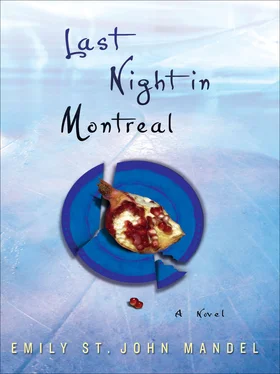“You just said you were leaving.”
“She only stayed with me because she wanted me to tell her what happened that night, why she had those scars on her arms. I only stayed with her because I wanted her to tell me about an accident, and now that you’ve told me, I wish I didn’t know.” There was an uneven quality to her voice, and a brightness in her eyes that struck him as unhealthy. “Did you notice them?”
“Notice what?”
“The scars, ” she said.
“Of course I did.”
“Her mother threw her through a window.” She fumbled in her pockets again; she lit another cigarette and smiled terribly. “That’s the part of the story she doesn’t know, the part she doesn’t remember. Partial amnesia is the most remarkable thing.”
“Jesus Christ,” he said.
“Fortunately,” said Michaela, “it’d snowed heavily the night before. Cushioned the fall, I’d imagine. Probably saved her life.”
“I don’t want to know any of this. All I want to know is where she is.”
“No,” she said, “you need to know the story, so you can tell it to her when you see her next. I’m not sure if I’m going to see her again. So listen to me, this will just take a second: her mother threw her through a window. She was seven years old. She lay in the snow until her brother came out to get her.”
“Her brother?”
“Simon. He was nine or ten at the time. Simon said the mother was hysterical, weeping and carrying on. She told Simon much later that she never knew what it was about Lilia that made her want to annihilate her so desperately, but there it is: she throws her seven-year-old daughter through a window at night and leaves her outside in the snow. Remember, we’re talking about Quebec in the wintertime. It was probably as cold that night as it is now.”
He was silent, watching her.
“Simon went outside to get her. She landed in a deep snowdrift outside the window; nothing was broken, but she had cuts all over her arms from the glass. He got her back into the house and put towels around her arms to stop the bleeding, and then he called Lilia’s father, his ex-stepfather. . He told his sister’s father to come get her. Do you understand? Her own brother arranged her abduction,” she said.
It took him a moment to recover his voice. “Lilia doesn’t remember this?”
“None of it. She doesn’t know what happened. There was a first-aid kit somewhere in the house; Simon bandaged his sister’s arms as best he could, got her upstairs and put her to bed and lay down to wait in the room next door. He left the front door unlocked. Lilia’s father came late that night and saw the broken glass in the snow, just like Simon told him. When she came downstairs, her father took her away. Amazing, isn’t it? That’s the moment when Lilia’s memories begin; her father throws broken glass at her bedroom window, and she hears the sound and sits up in bed.”
“Michaela, you have to tell me where she is.”
“Fairly close by, I imagine. She rents a room not far from here.” She held her cigarette up in the air. “My last cigarette,” she announced. “I’m quitting tonight.”
“Good. You smoke too much.”
“I’m going into the subway system,” Michaela said. She stepped backward. “Which way are you going?”
“I don’t know yet, Michaela. You have to tell me where to go.”
“Why should I?” She was more interested in the cigarette. She inhaled deeply, looked at it for a second, and then dropped it half finished into the snow.
“I am so tired,” Eli said. “It’s so cold out here. I want to go home.”
She took a few more steps backward, away from him. He watched the movements of her sleek boots on the precarious ice. The toes were scuffed. “She’s been renting a room on Rue de la Visitation,” she said finally. “Corner of Ontario Street, in Centre-Sud. East of here. You just follow Ontario Street that way, ten or so blocks. It’s the brown building on the southwest corner, across from a restaurant that used to be a gas station. Her building sort of sags outward toward the street. There’re always transvestite hookers in front of it.” She gestured in a northeasterly direction. “Say good-bye to her for me?”
“I will.” He was moving away from her, waving, already somewhere else. “Thank you,” he said. “I’ll call you tomorrow.”
She turned away without answering. He watched her recede for a moment and then began walking as fast as he could over the ice. West on Ontario Street toward Rue de la Visitation, and even this coldest of cities seemed suddenly exquisite to him. The blank cement architecture was refreshingly clean-lined. The wide empty streets were calm instead of lifeless. The cold was almost bracing. The exhaustion that had settled over him in the weeks since she’d gone was beginning to lift, slowly, in increments too small to be individually observed, the way mist rises from a river in the morning. She wished she’d never left New York.
He didn’t get very close to Rue de la Visitation. Michaela’s last few words were pulling at him— Say good-bye to her for me? — and near the corner of St.-Laurent he understood; Eli stopped as if shot in the amber streetlight and turned back the way he had come. Walking quickly at first, but then he broke into a run; back toward the parking lot, gasping in the ice-locked air. His teeth hurt with each footstep on the frozen pavement, the cold burning his face. He ran back to Place-des-Arts in the staggering cold, he threw himself down the stairs of the Métro Place-des-Arts station and ran past the ticket booth, vaulting over a turnstile and running faster, down to the level of fast underground trains, faster still, but the girl at the far end of the westbound platform had been standing there for several minutes by the time he saw her, and the trains were running slightly ahead of schedule that night. It was warm down here; she had taken off her silver jacket and folded it neatly on a nearby bench. The Halloween wings were still on her back, although now they were lopsided, and an empty red cigarette box was crushed in one hand.
Although the subway lines of all cities differ in details, the sequence of events is more or less the same: first a slight wind down the length of the tunnel, a few seconds before even the sound of the train. Then (depending on the city, the design of the subway system, the specifics of the individual station) there are a few seconds or even a full minute of approaching light: twin beams through the darkness, and by now the approaching thunder of sound. By the time Eli reached the platform, pursued by a police officer who’d watched him jump the turnstile at the ticket booth, he could already see the lights. Approaching at a merciless speed into the station, closer and closer to the waiting girl. There were people on the platform, some looking at him now as he ran — he thought he heard someone say his name — but he was aware of no one but Michaela in that moment.
It’s possible that she didn’t hear him screaming her name as he ran full speed down the platform toward her. She was utterly intent on what she was about to do just then, poised on the edge with one foot slightly forward, like a tightrope walker about to step out onto the rope. She was looking at the approaching lights.
Eli was screaming in formless sounds now — although the pursuing official hadn’t noticed the girl and kept calling out for him to stop in perfectly comprehensible French — but screaming halts nothing.
In the instant before the train would have passed her, the girl stepped forward into the onslaught of air.
Sometimes at night Simon still thinks of his sister’s departure, of watching from the landing window as Lilia’s father carried her away across the lawn, the way she clung so tightly to her father’s neck — the bandages Simon had put on her arms a few hours earlier stark white in the moonlight — until they disappeared into the forest. There’s a number that he dials sometimes from memory, on nights when he can’t sleep. He pressed *69 once, when he was very young, and wrote the number down on his hand. No one ever picks up, but he’s soothed by the crackle of static over the line, and there’s a pleasing sense of bridging tremendous distance. The ringing sounds unfathomably far away.
Читать дальше












